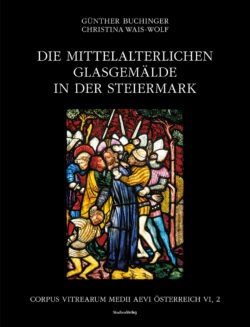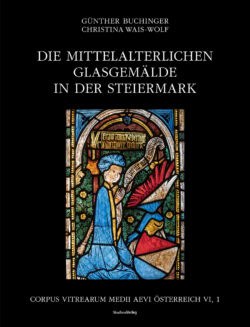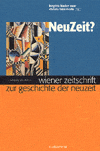Einzelheft StudentInnen (Bestellung mit Beilegung einer
Inskriptionsbestätigung): Euro 14,40
Themenschwerpunkt „NeuZeit?“
(Herausgegeben von Birgitta Bader-Zaar und Christa Hämmerle)
Beiträge
Erich Landsteiner: Epochen, Stufen, Zeiten. Vom historistischen Epochenschema zu Fernand Braudels Dialektik sozialer Zeitabläufe
Martin Scheutz/Harald Tersch: Individualisierungsprozesse in der Frühen Neuzeit? Anmerkungen zu einem Konzept
Anna Clark: Women in Public in Eighteenth Century Britain. The Problem of Periodization
Alice Pechriggl: Postmoderne als epochê in der Moderne? Zur Dialektik von Nachträglichkeit und programmatischer Antizipation einer un/möglichen Epochalisierung
Forum
Roumen Daskalov: Periodization of the History of the Balkans – Some Considerations
Jan-Georg Deutsch: Periodisierungen in der Afrikanischen Geschichte
Fernando J. Devoto: Periodization in Latin American History: Problems and Questions
Ulrich Goch: Die Diskussionen um die Moderne in Japan
Thomas Angerer: Gegenwärtiges Zeitalter – gegenwärtiges Menschenalter. Neuzeit und Zeitgeschichte im begriffsgeschichtlichen Zusammenhang
Christoph Treiblmayr: Rosa Luxemburg – eine Feministin? Überlegungen anhand ihrer Tätigkeit als Dozentin an der zentralen Parteischule der Sozialdemokratischen Partei Deutschlands (1907-1914)
Berichte
Neu gelesen
Thomas Fröschl: Hans Blumenberg, Die Legitimität der Neuzeit – Das Buch und sein Titel
Rezensionen
Wolfgang Schmale: Reinhart Koselleck, Zeitschichten. Studien zur Historik
Margarete Grandner/Martina Kaller-Dietrich: Johan Hendrik Jacob van der Pot, Sinndeutung und Periodisierung der Geschichte. Eine systematische Übersicht der Theorien und Auffassungen
Dana Stefanová: Anette Völker-Rasor (Hg.), Oldenbourg Geschichte Lehrbuch. Frühe Neuzeit
Martin Scheutz: Markus Reisenleitner, Frühe Neuzeit, Reformation und Gegenreformation
Winfried Schulze: Mitchell G. Ash (Hg.), Mythos Humboldt. Vergangenheit und Zukunft der deutschen Universitäten
Wolfgang Reinhard: Wolfgang Schmale, Geschichte Europas
Aus dem Editorial: Neuzeit als Epoche – ein notwendiges heuristisches Prinzip?
Fragen nach der Einteilung der Geschichte in Epochen, nach Epochenschwellen und Epochenbewusstsein haben offenbar noch immer Konjunktur, ebenso wie jene allgemeineren nach dem Verhältnis von Zeit und Geschichte, Kontinuität und Diskontinuität. Dass sie die Geschichtswissenschaft immer wieder beschäftigen, stets neu gestellt und neu diskutiert werden, bezeugen zuletzt nicht nur einige durch die jüngst erfolgte Jahrtausendwende motivierte Schwerpunkthefte diverser Fachzeitschriften und andere einschlägige Publikationen. Das Problem, ob die von Christoph Cellarius in den 1670er und 1680er Jahren in seinen Werken vermittelte, sich seit dem 18. Jahrhundert durchsetzende historiographische Trias Altertum – Mittelalter – Neuzeit überhaupt noch Gültigkeit haben kann, scheint nach wie vor ungelöst, und nach wie vor begeben sich die einen auf die Suche nach passenden neuzeitlichen „Epochenbegriffen“ oder der „gefährdet[en]“, gar „verloren“ geglaubten „Einheit der Neuzeit“, während andere bereits deren Ende proklamiert haben oder vor einer „Zäsurideologie“ in Hinblick auf strikte Begrenzungen warnen. Mitunter wird Periodisierung auch als bloße morphologische Übung betrachtet und ausschließlich „dem Kenntnisstand und den Erkenntnisinteressen der Gegenwart“ zugeschrieben, was ihren willkürlichen und künstlichen Charakter unterstreichen soll. Auch das wird schon seit längerem diskutiert; das Bemühen um eine „global history“ hat solchen Überlegungen nur zusätzliche Brisanz verliehen. Bewusst gemacht oder nicht, gehört die Problematik der Epochenbildung seit jeher zu den theoretischen Prämissen des Faches.
Ist es angesichts des kontinuierlichen Interesses an Periodisierungsfragen tatsächlich so, dass „alle Fortschritte der Historie immer wieder zurück zu Einsichten [führen], die nur neu formuliert werden müssen, nicht unbedingt neu sind“ – wie Reinhart Koselleck meint, der sich an den Debatten um die Einteilung der europäischen Geschichte in Epochen maßgeblich beteiligt hat? Seit langem weisen er und andere, wenn auch häufig nur mit dem Blick auf Westeuropa, auf die Fragilität und die Relativität des Begriffs „Neuzeit“ und der damit verbundenen Epochentrias hin – eines Konzepts, dem heute nur noch partielle Bedeutung zugestanden wird. Was spricht für seine weitere Verwendung, und was dagegen?
Zur Beantwortung solcher Fragen hat das vorliegende Heft einen Diskussionsansatz gewählt, der sich exemplarisch auf Zugänge verschiedener Teil- oder Nachbardisziplinen der neueren Geschichtswissenschaft konzentriert. Wir haben einige Kolleginnen und Kollegen eingeladen, aus ihrer jeweiligen Perspektive erneut nach der Relevanz von Epochengliederungen zu fragen, das Für und Wider in Hinblick auf mögliche Zeitbrüche abzuwägen und Konzepte vorzuschlagen, um der „prinzipiellen Problematik jedweder Periodisierung“ in Hinblick auf die „Neuzeit“ zu begegnen. Im Brennpunkt sollten dabei insbesondere jene Zäsuren stehen, die innerhalb der Forschung bisher am stärksten diskutiert wurden, nämlich diejenige um 1500 als dem angeblichen Beginn der „Neuzeit“, die so genannte „Sattelzeit“ um 1800 und schließlich die Frage nach dem Verhältnis von „Moderne“ und „Postmoderne“.
Birgitta Bader-Zaar und Christa Hämmerle
Abstracts
Erich Landsteiner: Epochs, Stages, Times. From the Historicist Model of Epochs to Fernand Braudel’s Dialectics of Multiple Social Times
Considering that time is a basic historical subject-matter and that periodization therefore is an essential component of historical research and the teaching of history, this study pursues the question why the traditional model Ancient History/Middle Ages/Modern History still determines the institutional structures of historical studies in spite of its permanent challenge in historiographical practice. The disaccord between research practices and the tripartite model is generally interpreted as a legacy of historicism. This study shows that the fixation of the historical paradigm to the problem of epochs is not, as is often maintained, attached to a certain field in history, for example political history, the more so as also German economic history adhered to it in its beginnings. The author views Fernand Braudel’s concept of history as dialectics of multiple social times as a possible route towards overcomingthe historical paradigm. The debates on the concept of the industrial revolution as a fundamental criterion of periodization of European economic history exemplify that any general statements on continuities and breaks in the historical process can only be results of research and not its predetermined framework.
Martin Scheutz/Harald Tersch: Processes of Individualization in the Early Modern Period? Annotations to a Concept
Research on early modern history has lately emphasized the materialization of the individual as a feature of the period. The slow process of individualization, which began in the late Middle Ages, can especially beobserved in written sources such as self-testimonies and judicial records. However, the exact content of the term „individualization“ is often rather vague, and has been strongly influenced by nineteenth-century scholarship, which assumed that individuals were formed by subjectivity, personal observation and an abstract level of reflection. In fact, only some traces of these marks of individuality can be found in early modern self-testimonies. Moreover, very few texts have been examined with regard to the concept of individualization; most still rest unknown in numerous archives as recent publications on Austrian and German self-testimonies have shown.
Based on the analysis of several seventeenth-century self-testimonies (by Adam Bernd, Johann Beer, Lukas Geizkofler) and judicial records (the trial against the peasant ringleader Martin Laimbauer in 1636), this article points out that the discovery of the „individual“ in the late Middle Ages as a threshold to a new epoch should at least consider the lack of any generally binding definition of individualization. Early modern individuals, formerly interpreted as singular, pale in the wake of a closer intertextual analysis. As is shown here by Thomas Platter’s famous account of his burning of a saint’s statue, passages which seem to be characteristic for an author’s view can be decoded as skillfully installed quotations. Thus, individualization often becomes a catch phrase and cannot contribute much to the question of periodization in the present state of research.
Anna Clark: Women in Public in Eighteenth Century Britain. The Problem of Periodization
Women’s historians debate whether women advanced into the public during the eighteenth century or were pushed out of public life. This article argues that one cannot generalize about women and the public. Rather, aristocratic, plebeian, and middle-class women need to be considered separately, as well as the different meanings of the public: aristocratic society, the economy, public associations, or culture, for instance. While plebeian and middle-class women made some economic gains, they could not gain the status of skill, access to large-scale international commerce, or men’s associations during the eighteenth century. Elite women’s education improved, but they had to conform to polite definitions of sensibility. Though they also played an important role in aristocratic politics, their influence was challenged by radicals and reformers who believed politics should be more open and representative. However, these radicals and reformers also defined the citizen as masculine. Nonetheless, in certaineras, such as the first two decades of the eighteenth century, the 1780s, and the 1790s, some women were able to express their political opinions as politics opened up. When the government repressed public association and debates, feminism, too, was crushed, replaced by a conservative notion of female domestic influence.
Alice Pechriggl: Postmodernity as epochê in Modernity? On the Dialectics of Subsequence and Programmatic Anticipation of an Im/Possible Epochalization This essay tries to elaborate on some crucial connections between „postmodernity“ as a socio-philosophical concept and as a historicized phenomenon. Epochalization is one of these crucial connections. The act of defining an age, period or epoch through a kairos (the decisive moment of change, the opportunity which ought to be taken) and through the detachment of a new socio-historical formation from an older one, considered to be finished or passed, leads to the sceptic concept of epochê. The philosophy of history and temporality needs to reflect on this widely neglected concept in order to create a better understanding of postmodernity and postmodern theories. The conclusion of this essay resumes other works about how the conflicting relation between an idealistic as well as dogmatic postmodernism and „modern scepticism“ included in poststructuralist and postmodernist theories also operates in feminist approaches to gender relations. These approaches nonetheless need to be seen as part and parcel of the project of modernity radicalized through engaged scepticism.
Thomas Angerer: Present Age versus Present Lifetime. Historical Correlations Between the Terms „Modern History“ and „Contemporary History“
Drawing critically on Reinhart Koselleck’s findings on the historical developments of German terminology and enlarging the scope of investigation to France, Spain, Italy, Britain, and the United States, this article proposes a new, parallel, and comparative analysis of the changing notions of „modern“ and „contemporary history“. Originally, both terms shared a common meaning: the history of one’s own time as opposed to times without surviving witnesses. If „modern history“ took up a second meaning which eventually dominated over the first one, similar tendencies and related problems could and can be observed with „contemporary history“. The article argues against attempts to present „contemporary history“ as a sort of new modern history, relegating traditional „modern history“ to the past. Instead it pleads for both being fundamentally different, however complementary historical approaches to the present.
Christoph Treiblmayr: Rosa Luxemburg – a Feminist? Reflections on her Career as Lecturer at the Central Party School of the German Social Democratic Party (1907-1914)
Focusing on Rosa Luxemburg’s career as a lecturer at the Central Party School of the German Social Democratic Party in Berlin, this article discusses debates on the question if the German revolutionary can be placed among the „ancestresses of feminism“. Although Luxemburg rarely commented on women’s rights and hardly had any contacts with the women’s movement of her time, an attempt is made to establish criteria for such a categorization by exploring the way she herself reflected on her role as a woman in a male?dominated environment as well as the personal strategies she employed in coping with this environment. After a short introduction to the history of the Party School and Rosa Luxemburg’s work as a lecturer, the article examines the difficult situation of women at the elite school of the SPD by analyzing Luxemburg’s private correspondence of this period as well as reports by former students. This paper proposes that Luxemburg did not intend to satisfy expectations set by given role models, but rather tried to maintain her freedom of independent political action by a strategy that strictly separated the public from the private sphere.













